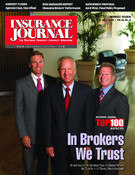Hint: Learn Before You Go
The ancient expression “When in Rome, do as the Romans do” is used to warn friends and colleagues to respect and adapt to the culture of places that they visit. In the insurance industry, that advice applies more than ever because: 1) There are more insurance markets than ever around the world, and 2) international markets need the expertise of insurance professionals more than at any time in history.
International insurance is booming. A 2007 survey by the International Insurance Society found that its members’ biggest problem was “new market opportunities.” Survey respondents see growth coming from emerging markets in Asia (especially China and India), Eastern Europe and Latin America. In more developed insurance markets, consumers and businesses are splitting into new segments, also creating opportunities.
The International Association of Insurance Supervisors, established only 14 years ago, represents insurance regulators and supervisors in 190 jurisdictions, and focuses on a range of issues including monitoring reinsurer solvency, standards and regulatory cooperation, and “microinsurance.”
Premium worldwide for all lines totaled $3.72 trillion, up 5 percent from 2006, according to Swiss Re data. Emerging markets grew at a 17 percent clip. The fastest-growing areas are Africa, Latin America, south and eastern Asia, and central and eastern Europe.
International Commerce on the Rise
Driven by emerging and changing markets, international commerce is headed skyward. Cross-border and cross-continent business relationships yield transactions ranging from a small souvenir purchase to the manufacture of the world’s largest industrial products.
As an example, Boeing in Washington state boasts that the forthcoming 787 Dreamliner passenger jet is being manufactured with systems delivered from Italy, Canada, Australia, Japan, United Kingdom, France, Germany, Sweden, Korea and more than a dozen U.S. states. Dozens of suppliers are collaborating, stimulating the building of more than 3 million square feet of new manufacturing facilities worldwide, Boeing said.
Talk about a ripple effect: The production of industrial products and other goods and services touch local independent agents and brokers throughout the United States, as contractors and subcontractors provide links for the supply chain.
Think of the complexity of insuring a GE engine assembled in Ohio and shipped to Washington state to be combined with major systems delivered by business partners worldwide.
In short, the demands of international commerce are giving the industry access to more markets, more risks, and more partners. With this broad new world of international risks comes opportunities and challenges on Main Street.
Global Collaboration
Although an independent agent may never leave his desk, he or she must be ready for global collaboration to win new business and assess international risks.
Take, for example a contractor that supplies fuel to the U.S. military. The firm’s trucks pick up fuel in Pakistan, Turkmenistan and Uzbekistan and drive it into Afghanistan. The risks are obvious but complicated: liability for refueling operations; property coverages for premises and equipment (including war and terrorism); liability cover for the security contractor employed by the firm; personal accident insurance for employees; Defense Base Act workers’ compensation; kidnap and ransom; political risk coverage; aviation refueling liability; and professional and general liability. With operations in four countries, there are layers of exposure with varying civil litigation risks. And the firm is subject to U.S. contract and tort law environments, as a federal contractor.
There’s no way one broker alone could assess and place all the risks, but in concert with experienced partners, the risks are assessed and quoted.
Thousands of insurance professionals are being called upon to assess international exposures. They must consider the laws, business customs, geopolitical landscape, economic conditions and government regulation that affect the exposures that clients face when engaged in any international business. No matter what level of experience brokers have, they must be mindful of the rapidly changing risk outside the United States.
Doing business overseas is like traveling to a foreign country. It’s prudent to check-up on the latest in currency exchange, customs, safety and other issues. Truly, when in Rome, do as the Romans. Just research what they’re doing before you go.
Topics USA Agencies Contractors
Was this article valuable?
Here are more articles you may enjoy.


 Trump’s Repeal of Climate Rule Opens a ‘New Front’ for Litigation
Trump’s Repeal of Climate Rule Opens a ‘New Front’ for Litigation  Florida Insurance Costs 14.5% Lower Than Without Reforms, Report Finds
Florida Insurance Costs 14.5% Lower Than Without Reforms, Report Finds  Nine-Month 2025 Results Show P/C Underwriting Gain Skyrocketed
Nine-Month 2025 Results Show P/C Underwriting Gain Skyrocketed  ‘Structural Shift’ Occurring in California Surplus Lines
‘Structural Shift’ Occurring in California Surplus Lines 


